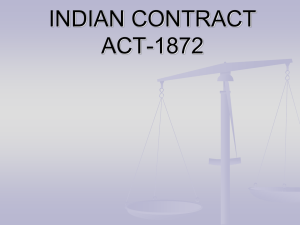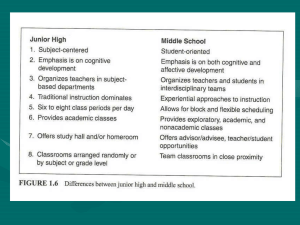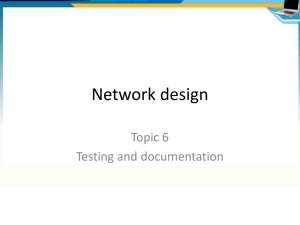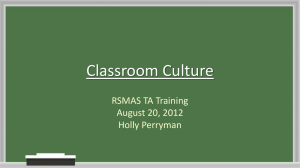Self-acceptance
advertisement
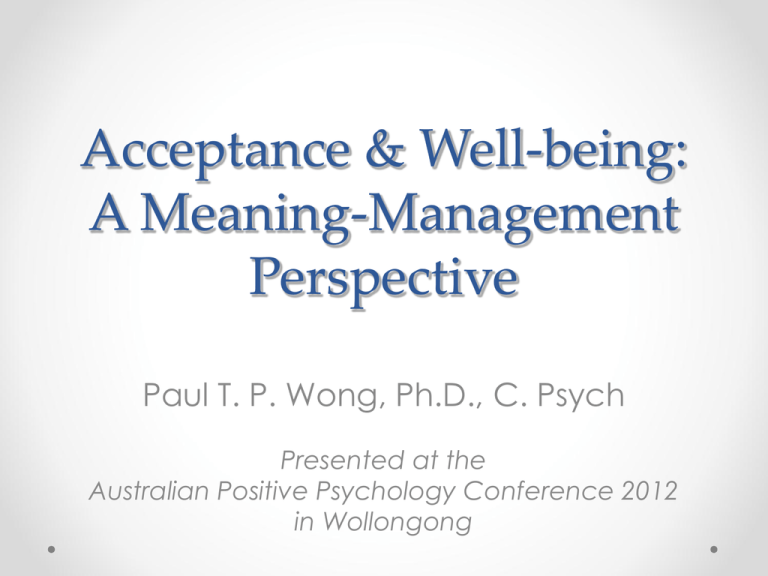
Acceptance & Well-being: A Meaning-Management Perspective Paul T. P. Wong, Ph.D., C. Psych Presented at the Australian Positive Psychology Conference 2012 in Wollongong On Overview The positive psychology of acceptance Types of well-being The role of acceptance in well-being Pathways & adaptive functions of acceptance • Acceptance in psychotherapy • A meaning-management perspective • • • • Negative Perceptions of Acceptance • The adaptive value of acceptance not widely recognized in PP. • Not generally perceived as positive emotion • Not considered as a proactive and effective way of coping • Associated with personal weakness, passivity, helplessness, resignation The Positive Psychology of Acceptance • • • • • • • Acceptance and mindfulness Acceptance, compassion and tolerance Acceptance as a component of well-being Acceptance as a coping strategy Self-acceptance Death-acceptance Acceptance and commitment therapy Types of Well-Being • • • • • • • • • Hedonic well-being Eudemonic well-being Spiritual well-being (Chaironic well-being) Psychological well-being Physical well-being Social well-being Subjective vs. objective well-being Self vs. others Short-term vs. long-term well-being Ryff’s Model of Psychological Well-being 1.Autonomy 2.Environmental mastery 3.Personal growth 4.Positive relations with others 5.Purpose in life 6.Self-acceptance Keyes & Magyar-Moe’s Model of Social Well-Being 1. 2. 3. 4. 5. Social integration Social contribution Coherence Actualization Acceptance Wong’s (1998) Implicit Theory of the Good Life 1. 2. 3. 4. 5. 6. 7. 8. Acceptance Achievement Relationship Intimacy Self-transcendence Religion/Spirituality Fair treatment (social justice) Positive emotions Seligman’s (2011) PERMA model of well-being • • • • • Positive emotions Engagement Relationships Meaning Achievement Keyes and Lopez (2002) Complete Mental Health • Complete mental health consists of emotional, social, and psychological wellbeing in addition to the absence of mental illness symptoms. • Thus, the ability to prevent, recover or transcend mental illnesses or negative emotions is part of the complete mental health. Pathways of Acceptance and Adaptive Functions Self-acceptance: Authenticity & Eudaimonia 1. Serve as a staging point for positive change. 2. Reflect on self to facilitate unconditional selfacceptance. 3. Develop one’s true self or authenticity. 4. Experience eudaimonia by living according one’s true self. Pathways of Acceptance and Adaptive Functions Accepting Others: Positive Relationships • Accept others based on empathy and the reality that we are all fellow human beings sharing the same boat in a sea of suffering. • Contribute to mutual trust and understanding • Provide the basis for unconditional positive regard • Enhance genuineness & authenticity • Contribute to mindful interactions • Contribute to community development Pathways of Acceptance and Adaptive Functions Death-acceptance: Faith, Authenticity & Passion for Living • Three types of death acceptance: Approach, Avoidance & Neutral • Recognize the fragility and finitude of life • Learn to live with one’s limitations and the existential anxiety • Make the most of one’s brief life by living authentically & passionately • Overcome death anxiety through faith, meaning, & relationship Pathways of Acceptance and Adaptive Functions Accepting What Cannot Be Changed: Wisdom Energy conservation • • • • • • Learned helplessness or acceptance of reality Learn when to disengage and let go Conservation of energy & reduction of stress Learned wisdom, flexibility & creativity Serenity prayer The way of the water Lao Tzu in Tao Te Ching (Chapter 8): "Human virtue, at its best, is like water, which nurtures all things quietly without contenting with anything. It flows to places despised by all, yet by staying there, it stays close to Tao [the Way]." Pathways of Acceptance and Adaptive Functions Accepting the Here and Now • Mindfulness awareness is a state of mind, a mindset • OCEAN: Openness, Compassion, Empathy, Acceptance & Non-judgment • Facilitate self-awareness and self-understanding • Make us more aware of others and connections • Stress reduction, emotion regulation, and relaxation • Transform negative emotions and suffering • Increase inner serenity and subjective well-being Pathways to Well-Being Unconditional Acceptance of Self Meaning Mindset Unconditional Acceptance of Others Unconditional Acceptance of Death & the Inevitables Unconditional Acceptance of Unavoidable Stress Unconditional Acceptance of the Here and Now Meaningful Living, Positive Mental Health, Pursuing an Idealistic but Realistic Dream Accepting Personal Limitations, Weaknesses, & Reducing Frustration Meaningful Relationships, Empathy, Gratitude, Harmony, & Positive Organization Reducing Conflict, Prejudice, & Misunderstandings Valuing Life, Pursuing What Really Matters, Making the Most of Life Wisely Reducing Death Anxiety & Unnecessary Worries Rational & Realistic Appraisal, Appropriate & Congruent Coping Reducing Frustration, Saving Time & Effort Appreciation of Life, Openness to New Experiences, Increasing Insight Reducing Judgmental Attitudes & Reducing Negative Emotions Acceptance in Psychotherapy • • • • • • • • Reduce resistance and denial Increase a sense of personal responsibility Open opportunities for change and transformation Facilitate tragic optimism (Viktor Frankl) Facilitate addiction recovery Contribute to resilience Acceptance and Commitment Therapy Meaning-centered counselling and therapy Meaning-Management Theory (MMT) Definition • Meaning management refers to how we manage meaning-seeking, meaning-making, and meaning reconstruction in order to survive and flourish • Meaning management focuses on the selfregulation of our inner life through meaning Assumptions of MMT • People are meaning-seeking and meaning-making creatures • We live in a world of meaning. • The meaning we attribute to events affect us more than the events themselves • The human capacity for meaning offers them the best protection against threats and losses and the best means to achieve complete well-being. Meaning-Seeking & Acceptance Self-Acceptance Other Acceptance Death Acceptance Who am I? What was I meant to be? What matters most in my life? What is on their mind? What are they really saying? What is my mission & purpose in life? What do they want from me? In what ways am I unique? What is their perspective? What is the point of striving? What happens after death? How is my death different from the death of an animal? How can I die a good death? How can I make a difference? What are their cultural values? Stress Acceptance Why now? Acceptance of the Here & Now What am I experiencing? What’s the purpose of Is there anything new? this happening? What’s the meaning of suffering & loss? Explore my curiosities How can I benefit from this experience? Be attentive to my surroundings What is a good death? How could God allow this to happen? Be attuned to spiritual experiences What are their aspirations? What is worth dying for? Is God punishing me? Be fully aware of changes What are their fears and hopes? Is that all there is to life? Is this cruel fate? Is this bad luck? Learn to be focused in listening and observing How can I live a worthy life? How can I be of help to them? What is the meaning of death? Will the pain ever end? Make sense of my subjective experiences What is the good life in spite of all my misfortunes? How can we better understand each other? What is our common destiny? How can I make my death a meaningful event? What are the existential givens? Is this a warning sign for me to change my life? Is it possible to live without stress? Where am I headed? What are my options? What are my strengths & weaknesses? Is this my fate? Is this a meaningful moment? The stress will soon pass away. Meaning-Making & Acceptance Self-Acceptance Discover meaning through creative work Other Acceptance Discover meaning through relating Develop meaningful relationships Engage in Do what I can do best meaningful activities with other Do something Be true to myself & do meaningful what is authentic together Do the right thing Create shared according to my vision & a common conscience & values purpose Do what I love & follow my heart Pursue my calling in spite of obstacles Do what’s meaningful Count my blessings Forgive myself for my mistakes & failures Pursue a common goal Construe positive meanings in others Express gratitude to each other Help and care for each other Death Acceptance Stress Acceptance Acceptance of the Here & Now Discover meaning through awareness of my mortality Discover meaning through a heroic attitude Discover the meaning & benefits of pain Discover meaning through experiencing the present moments Discover hidden strengths Practice mindfulness meditation Leave a legacy Make a difference in the world Engage in Transform something higher & negatives into bigger than myself positives Learn wisdom & Practice lessons from generativity suffering Develop ego Develop resources integrity through & support systems life review Live fully & make Deepen my faith & every day count pray for help Make the most of Practice altruism my life Become reconciled Practice selfwith others transcendence Practice mindful awareness Attribute meanings to experiences Appraise events of personal significance Discover sacred moments in daily events Create order from chaos Regard each present moment as a gift Become aware of effect of my choices Meaning-Reconstruction & Acceptance Self-Acceptance Other Acceptance Review my life & re-examine my life projects Redefine each other’s role in the relationship Re-author my life story Reassess my relationships Revise my meaning systems in starting a new chapter of life Death Acceptance Stress Acceptance Acceptance of the Here & Now Review my life Reappraise the & re-arrange my event based on priorities experience Look at things with a new lens Revise my will Reintegrate stress with my life Look at things from a different perspective Explore new grounds for rebuilding the relationship Reconcile with my estranged family members Reinvest my energy in other areas Develop a new mindset to look at life Revise my selfconcept Change one’s opinions & attitude about the other Renew my relationships with old friends Integrate my past with the present Revise the Re-evaluate and history of my recommit to my relationship with faith tradition the other Revise my cognitive schemas to Re-engage in life assimilate new information Expand my knowledge & Restore my wisdom to better broken dreams appreciate the present Conclusions • Acceptance is probably the most effective and versatile way of adaptation, capable of repairing the worst and bringing out the best in us. • The five pathways of acceptance cover five major life domains: a) Personhood, b) Relationships c) Existential issues regarding the human condition, d) Stress, loss & suffering; and e) Mindfulness. • It is an important but under-researched area in the positive psychology of well-being. Conclusions • The practice of acceptance enables us to become mature, responsible, positive, and resilient individuals, who in turn contribute to the development of a positive society. • Once we learn the lesson from the Forbidden Fruit, we will appreciate the wisdom and imperative of acceptance. • Our ability to live fully and meaningfully regardless of circumstances depends on learning to accept the negative and unchangeable aspects of life. • Acceptance represents the cornerstone of a balanced positive psychology.
